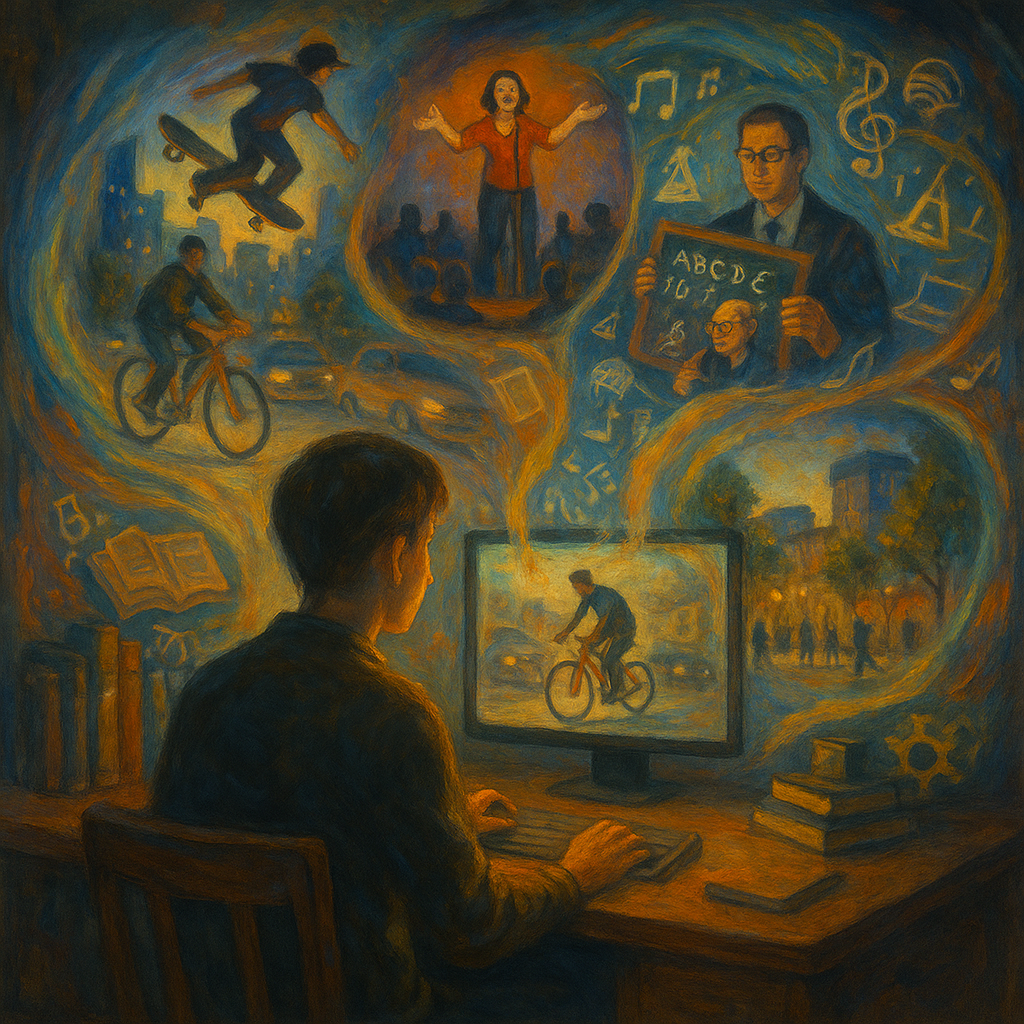Noise, Power, and Bullies
Noise pollution isn’t just irritating—it’s a health hazard. This post explores how loud vehicles and sudden explosive sounds impact people with sensory sensitivity or misophonia, and how our car-centric culture enables auditory bullying in public spaces.
Noise by Astraea
Misophonia is a condition where certain sounds don’t just annoy you, they provoke you. Not in a petty way, but in a fight-or-flight, heart-pounding, rage-rising kind of way. For me, some of the triggers are boom cars, revving engines, backfires, popping balloons, and just about any kind of sharp or sudden explosive noise. These sounds don’t just interrupt my day—they hijack my nervous system.
And I’ve started to wonder:
Why do so many people feel the need to make that kind of noise in public?
It’s not just sound. It’s dominance. Boom cars and thunderous trucks are a way for people to impose themselves on everyone else—like dogs marking territory with a roar instead of urine. It’s not expression. It’s bullying.
Our roads, unfortunately, encourage this behavior. Wide, fast, and poorly regulated, they’ve become playgrounds for aggression. They call it “freedom”. Freedom for who? For the loudest, fastest and most selfish? I and many other people, call it oppression. It’s an act of aggression. Especially for children, the elderly, veterans with PTSD, and those of us with sensory sensitivities—are told to just cope. (Not to mention the pets and other animals disturbed by the noise.)
And yet, the health effects of noise aren’t imaginary. They’re measurable:
According to the World Health Organization, chronic noise exposure increases the risk of cardiovascular disease, cognitive impairment in children, sleep disturbance, and mental health issues.
The EPA has linked prolonged exposure to environmental noise with increased stress hormone levels and reduced concentration.
A 2021 study in Environmental Health Perspectives found that urban noise pollution contributes to higher rates of anxiety and depression, even in people without sensory disorders.
The CDC warns that noise above 70 decibels (like a passing motorcycle or boom car) can cause hearing damage over time—yet we’re routinely exposed to much louder volumes in daily life.
I don’t think it’s a coincidence that noise ordinances are so rarely enforced. In many communities, enforcement is not a top priority and often handled by people who identify with the culture of speed, power, and volume. It’s hard to enforce peace when you admire the noise.
But what about the rest of us?
What about people who want their neighborhoods to be quiet enough to hear birds? To hear their own thoughts? To simply exist without flinching every time a car explodes past with bass so deep it makes your house shake, your bones rattle, and your nerves ignite?
Noise isn’t just annoying—it’s a form of control. It invades our homes. It pushes people out of public space. It elevates some voices over others. And it’s time we stop treating it as harmless.
We don’t need louder streets. We need better ones.
Further Reading:
World Health Organization – Environmental Noise Guidelines for the European Region
Environmental Health Perspectives – Urban Noise and Mental Health: A 2021 Review
EPA Archive – Noise and Its Effects on Health
Content Creators I Love And Why
Drawn to creators who live boldly or think brilliantly? This reflective post explores why we admire skaters, comedians, urbanists, and educators—and what it says about our own dreams, values, and curiosities.
Content Creators by Astraea
Admiring the Brave, the Brilliant, and the Bold
There’s something magnetic about watching someone live boldly in a way you wouldn’t—or maybe couldn’t—do yourself. I follow a lot of creators on YouTube, and at first glance, they may seem wildly different: skaters weaving through traffic, comedians roasting politics, lawyers breaking down Supreme Court cases, and urbanists dissecting city design.
But there’s a thread that ties them together: they’re all doing something I admire.
Something that, in another life—or maybe just another version of this one—I’d want to do too.
Take The Stuttering Skater or Terry B. They rollerblade and bike through New York City traffic like urban acrobats. They gracefully weave in and out of traffic, hitch rides, jump sidewalks, and even go down flights of stairs. It’s daring, chaotic, and thrilling. I don’t want to do it myself… but I want to feel what it’s like to move through a city with that much confidence, control and freedom.
Or comedians like Brent Terhune and Cliff Cash, who take risks with words, who stand on stages and challenge audiences to laugh—and think. That kind of sharp, public vulnerability? It’s powerful.
There’s also Stanzi Potenza, who blends absurdist humor, razor-sharp commentary, and unhinged theatrical delivery into something that feels part Greek tragedy, part TikTok fever dream. Whether she’s portraying divine chaos in skits as God and Satan or lampooning dystopian bureaucracy, she commits fully—loudly, hilariously, and fearlessly. She makes me laugh, yes—but she also makes me feel seen.
Then there are the experts: Fran Blanche of Fran Lab, the brilliant breakdowns from LegalEagle, or the urban insight of CityNerd and Not Just Bikes. They don’t just know things—they share what they know with passion and clarity. That kind of informed confidence is intoxicating to watch.
And of course, there are the thinkers, tinkerers, and educators—Joe Scott, Adam Savage, Miniminuteman (Milo Rossi), Today I Found Out, Strong Towns, the War on Cars podcast. They explain the world in ways that make you feel like you’re part of something bigger—and that knowledge matters.
Watching them isn’t just entertainment—it’s aspiration.
They remind me of things I care about: freedom of movement, humor with conscience, cities that work for people, the beauty of nerding out, and standing up for what’s fair and human.
Maybe you have your own list. People you admire not just for what they do, but for what they awaken in you.
That’s the power of good content—and good creators. They reflect who we are, who we could be, or who we hope we were brave enough to become.



